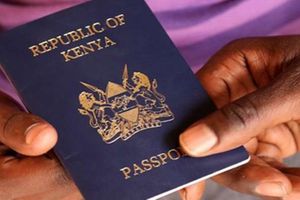From Trotsky to Morales, Mexico’s long exile tradition

Bolivia’s interim president Jeanine Anez shakes hands with the new Commander-in-chief of the Armed Forces, Army General Carlos Orellana, at the Quemado presidential palace in La Paz, on November 13, 2019. Anez, who declared herself interim president before her claim was endorsed by the constitutional court, arguing that her succession was necessitated by the resignations of those above her in the government hierarchy, will try to fill the power vacuum left by Evo Morales’s abrupt resignation, as the former leader denounced what he described as a “sneaky coup.”. Photo | AFP
What you need to know:
Morales, for his part, said Mexico “saved my life,” after exiting the Mexican air force plane sent to fetch him from a Bolivia in flames
Mexico City/La Paz. From Leon Trotsky to Luis Bunuel to Salvador Allende’s widow, Mexico has a long tradition of offering asylum to political exiles -- right down to newly arrived Bolivian ex-president Evo Morales.
Whether Republicans fleeing Francisco Franco after Spain’s Civil War or Argentines, Chileans and Brazilians fleeing military dictatorships in the 1970s, Mexico has welcomed many thousands of political asylum-seekers over the years.
“I’m very proud to head a government that guarantees the right to asylum,” President Andres Manuel Lopez Obrador said Tuesday, as Morales arrived after resigning amid growing unrest triggered by his controversial re-election to a fourth term.
Morales, for his part, said Mexico “saved my life,” after exiting the Mexican air force plane sent to fetch him from a Bolivia in flames.
According to retired Mexican diplomat Agustin Gutierrez Canet, one of the first political figures granted exile in Mexico was Nicaraguan revolutionary Cesar Augusto Sandino, who led an uprising against the US military occupation of Nicaragua in the 1920s.
However, Sandino left Mexico in 1930, frustrated at what he called the Mexican government’s broken promise to aid his cause.
An even more famous figure arrived seven years later: Trotsky.
Exiled from the Soviet Union in 1929 by Joseph Stalin, the Marxist revolutionary drifted from Turkey to Norway to France before finally landing in Mexico in 1937.
“It was the muralist Diego Rivera who asked President Lazaro Cardenas to grant (Trotsky) asylum. But we all know the consequences. Mexican protection failed and Ramon Mercader came along,” said Gutierrez.
Mercader, a Spanish communist and secret agent for the Soviet intelligence services, infiltrated Trotsky’s inner circle, then assassinated him with an ice axe at his home in 1940.
Under Cardenas, who was president from 1934 to 1940, Mexico also welcomed more than 20,000 Spanish exiles fleeing Franco’s regime after the Republicans’ defeat in the Civil War.
The Republican government-in-exile was based in Mexico from 1939 to 1946.
The exiles included the poet Leon Felipe, a friend of Che Guevara and Fidel Castro -- who himself fled to Mexico after waging an aborted rebellion in Cuba, then went on to launch the Cuban Revolution from there -- and Bunuel, the legendary filmmaker.
Bunuel, a one-time spy and propagandist for the Republicans, moved to Mexico in 1946, becoming a Mexican citizen and filming his classic movie “The Young and the Damned” there.
More exiles arrived during the brutal Latin American dictatorships of the 1970s. They included Hortensia Bussi, widow of Chile’s late socialist president Allende, who fled to the Mexican embassy in Santiago and ultimately Mexico itself after her husband died during the coup that ousted him in 1973.
Mexico also took in Central Americans during the wars that rocked that region in the 1980s, including Guatemalan indigenous activist and Nobel Peace Prize winner Rigoberta Menchu.
Politically risky
Taking in Morales could be a politically risky bet for Lopez Obrador, a fellow leftist elected last year.
It could strain the “peace and love” relationship he has sought to maintain with US President Donald Trump, who openly detests Morales. At home, Lopez Obrador’s opponents were quick to pounce.
Morales “is a dictator clinging to power! He’s a persona non grata in Mexico,” tweeted former president Vicente Fox, of the conservative National Action Party (PAN).
Even celebrated Mexican writer Elena Poniatowska, a Lopez Obrador ally, joined in.
“Why do presidents want to stay in power forever? Why does Evo Morales insist on believing there is no one but him?” she tweeted Saturday.
However, Gutierrez, the diplomat, said granting Morales asylum was in line with Mexico’s commitments under international treaties.
“It’s important that political asylum not be subject to ideological considerations,” he said. “It’s for people who are being politically persecuted, endangering their lives, liberty or safety.”
That was the case for Morales, he said.
Marta de Cea is glad for Mexico’s asylum tradition.
The 74-year-old Argentine woman fled to Mexico in 1976 after being kidnapped by the military regime.
“They helped us very much. I’m still here after more than 40 years. I’m a Mexican citizen. My home is here, my daughters are Mexican,” she said, her voice breaking. “I’m very grateful to this country.”
US recognizes Jeanine Anez as Bolivia’s interim president
The United States recognized Jeanine Anez on Wednesday as Bolivia’s interim president after the resignation of Evo Morales following weeks of turmoil.
“The United States applauds Bolivian Senator Jeanine Anez for stepping up as Interim President of State to lead her nation through this democratic transition, under the constitution of Bolivia,” Secretary of State Mike Pompeo said in a statement.
Pompeo said the United States looks forward to working with Bolivia and its people “as they prepare to hold free, fair elections as soon as possible.” He also called on Bolivians to refrain from violence amid tension between supporters and critics of Morales, who resigned on Sunday and later went into exile in Mexico.
Anez, 52, was deputy senate speaker before proclaiming herself acting president on Tuesday -- a move endorsed by the Constitutional Court.
She has already reiterated a pledge to “hold elections in the shortest possible time.”
Bolivia has been in political turmoil since a controversial October 20 election in which Morales was awarded a fourth term as president.
Stand-in president ‘brings back Bible’ to Bolivian politics
Mounting the steps of the presidential palace as acting head of state, Jeanine Anez raised in both hands an old leather-bound volume of the holy Gospels.
The gesture made it clear what side of the country’s political and social divide she was on -- and reflected the rise of Evangelical groups in the Latin American country.
Gone was Socialist leader Evo Morales, an atheist who had done away with oaths on the Bible and had overseen a new constitution that made Bolivia a secular state.
Now Morales’s opponents -- conservative and Christian -- were back in charge.
“God has allowed the Bible to come back into the palace. May he bless us,” Anez said.
“Glory to God!” yelled supporters gathered around her.
Anez ascended to the balcony of the palace, where she was handed another volume, a Bible in a purple cover, and waved it triumphantly.
Latin America is largely Catholic but over recent years other, Protestant-rooted churches have flourished.
In neighboring Brazil, they played a prominent role in the election that brought far-right President Jair Bolsonaro to power last year.
In Bolivia, a survey published in September by newspaper Pagina Siete indicated about 75 per cent of Bolivians were Catholic and about 18 percent Evangelical. (AFP)




